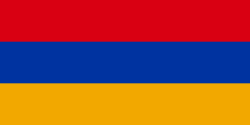| Armenia at the Olympics | |
|---|---|
 | |
| IOC code | ARM |
| NOC | National Olympic Committee of Armenia |
| Website | www |
| Medals Ranked 90th |
|
| Summer appearances | |
| Winter appearances | |
| Other related appearances | |
Armenia first participated at the Olympic Games as an independent nation in 1994, and has sent athletes to compete in every Summer Olympic Games and Winter Olympic Games since then.
Contents
- Medals
- Medals by Summer Games
- Medals by Winter Games
- Medals by sport
- List of medalists
- Flagbearers
- See also
- External links
Previously, Armenian athletes competed as part of the Soviet Union from 1952 to 1988, and after the dissolution of the Soviet Union, Armenia was part of the Unified Team in 1992.
Armenian athletes have won a total of 22 medals, in wrestling, weightlifting, artistic gymnastics, and boxing.
The National Olympic Committee of Armenia was created in 1990 and was recognized by the International Olympic Committee in 1993.